朗文外研社新概念英语第一册 第12节(Lesson23—Lesson24) 课件(60张PPT)
文档属性
| 名称 | 朗文外研社新概念英语第一册 第12节(Lesson23—Lesson24) 课件(60张PPT) |
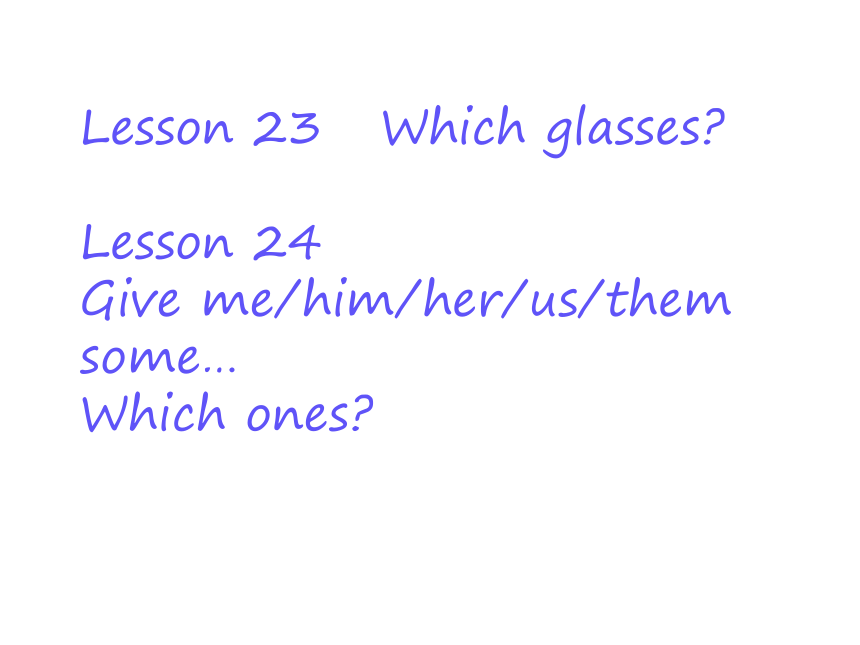
|
|
| 格式 | zip | ||
| 文件大小 | 10.9MB | ||
| 资源类型 | 教案 | ||
| 版本资源 | 其它版本 | ||
| 科目 | 英语 | ||
| 更新时间 | 2019-08-09 00:00:00 | ||
图片预览

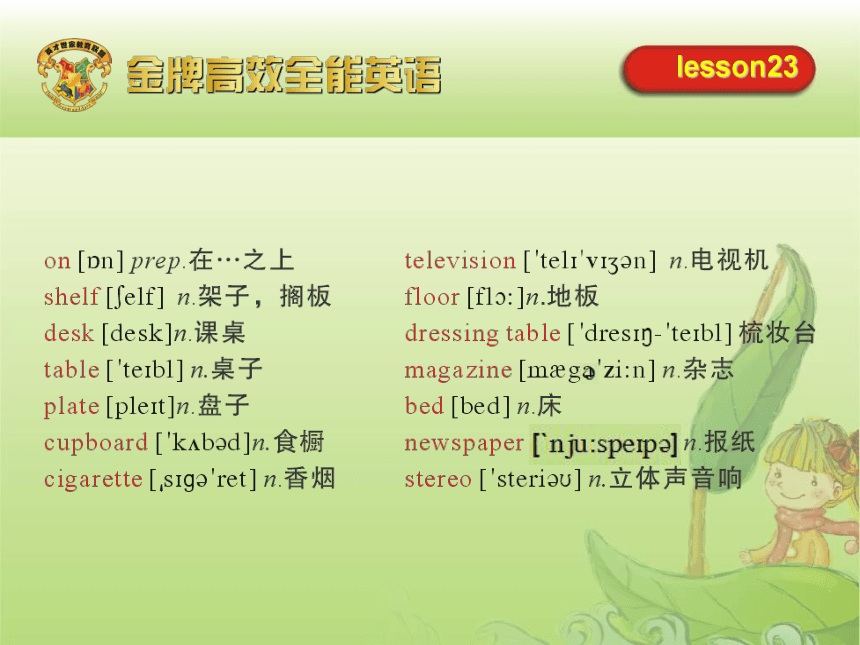

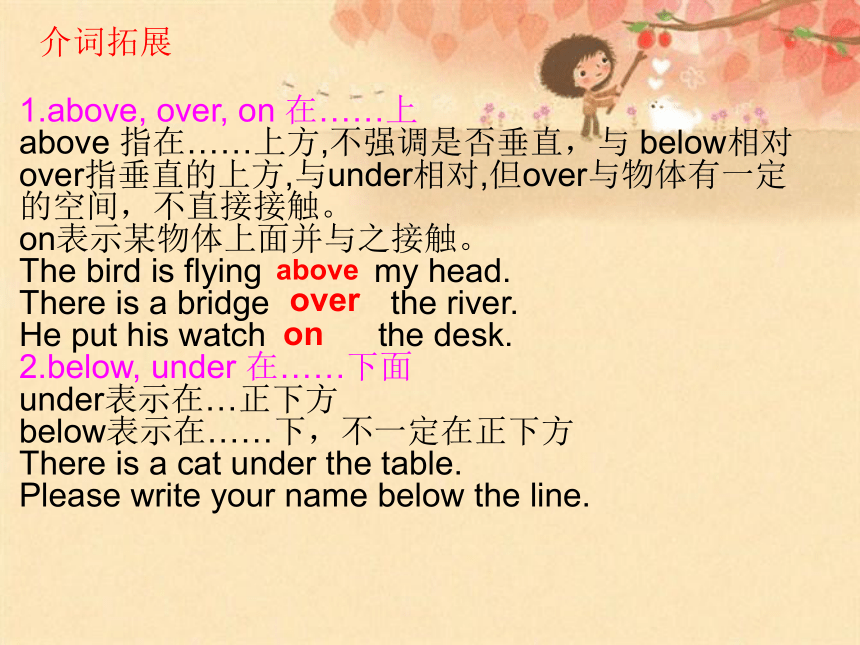
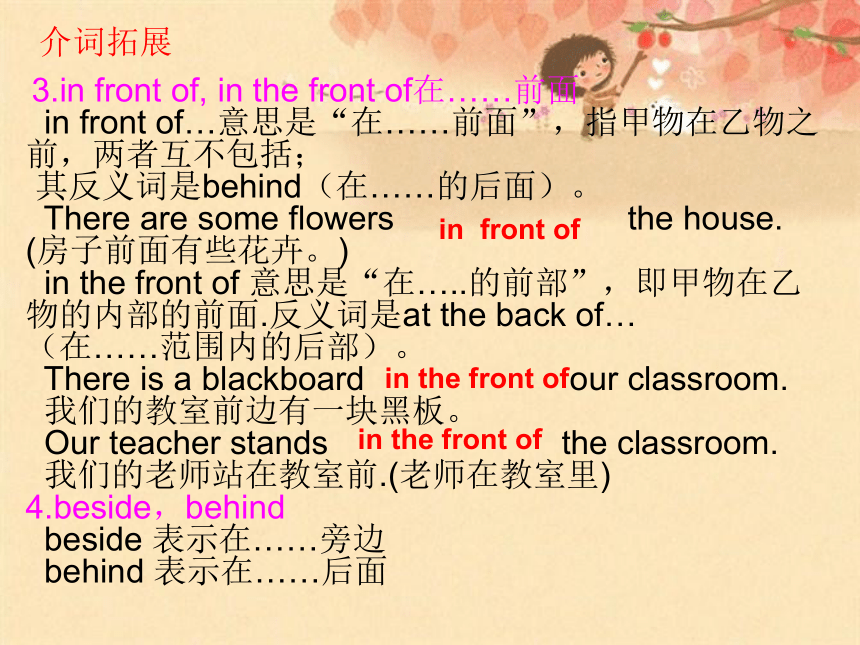
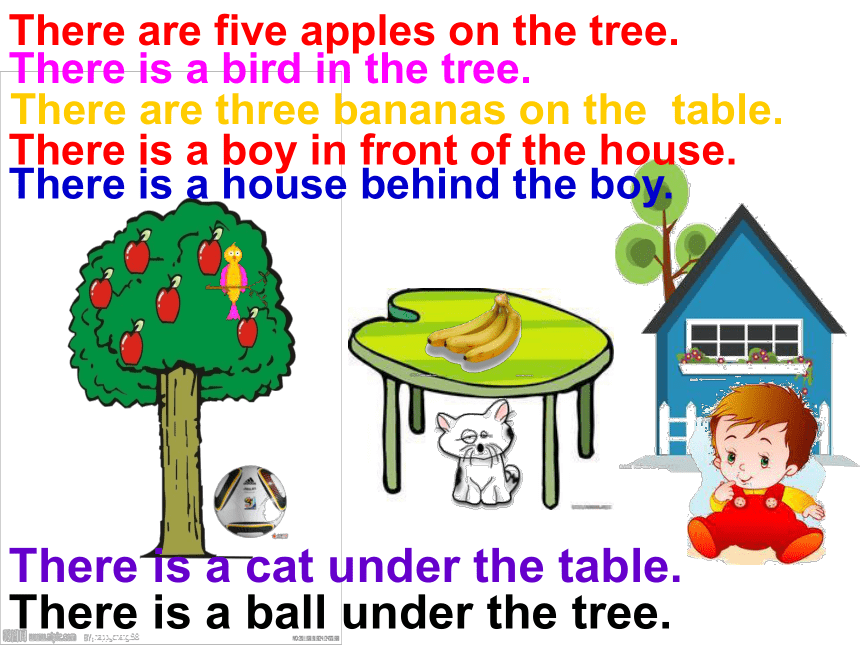
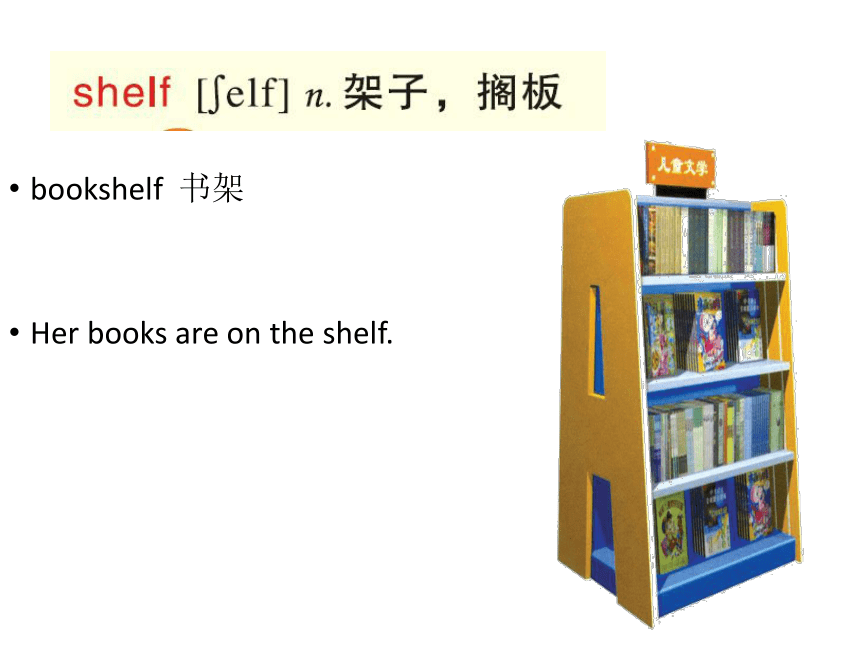
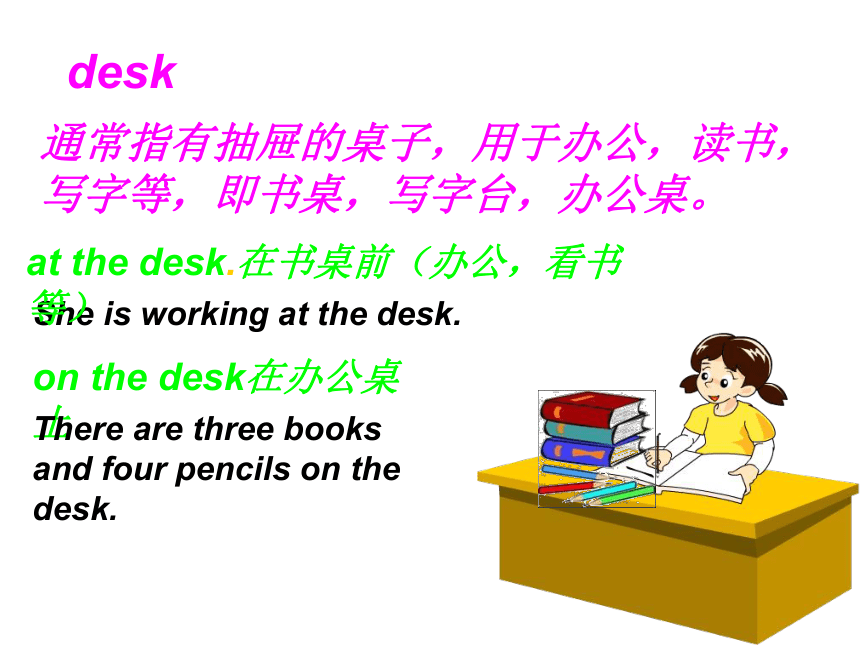
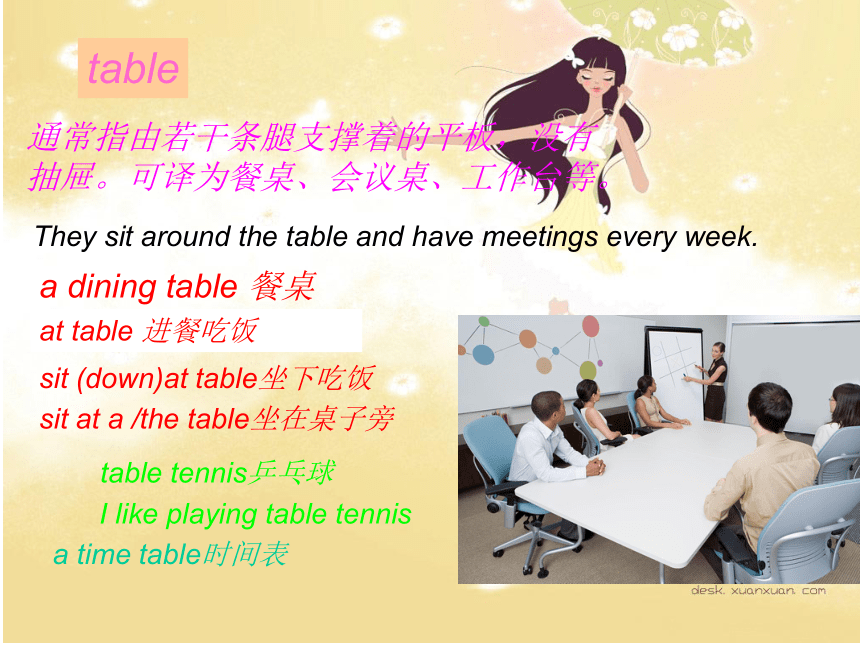

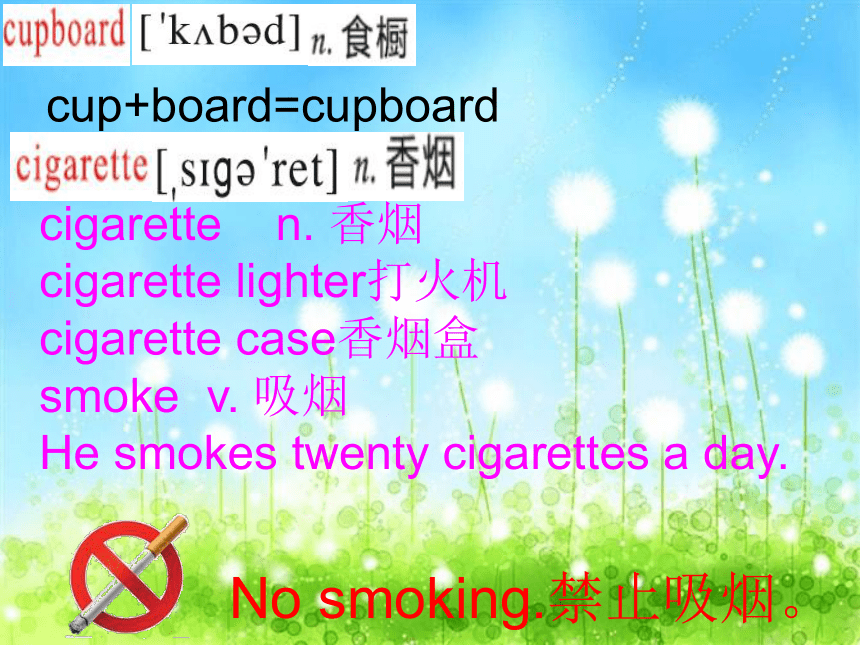
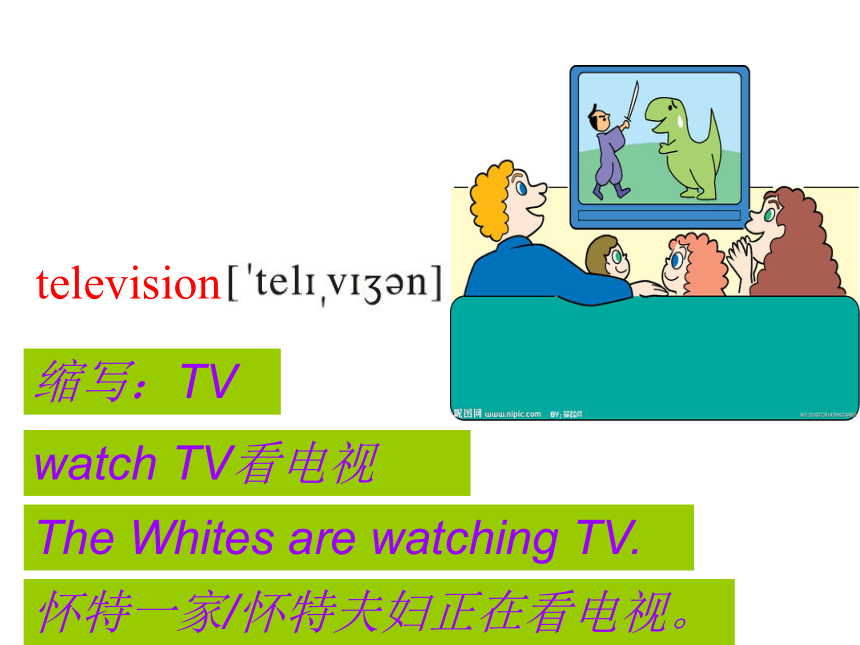
文档简介
课件60张PPT。Lesson 23 Which glasses?
Lesson 24
Give me/him/her/us/them some…
Which ones?
lesson23
prep. (继续)下去;不断地
(电灯)开
and so on 等等
on time 准时
on foot 步行
1.above, over, on 在……上
above 指在……上方,不强调是否垂直,与 below相对
over指垂直的上方,与under相对,但over与物体有一定
的空间,不直接接触。
on表示某物体上面并与之接触。
The bird is flying my head.
There is a bridge the river.
He put his watch the desk.
2.below, under 在……下面
under表示在…正下方
below表示在……下,不一定在正下方
There is a cat under the table.
Please write your name below the line.
介词拓展aboveoveron 3.in front of, in the front of在……前面
in front of…意思是“在……前面”,指甲物在乙物之前,两者互不包括;
其反义词是behind(在……的后面)。
There are some flowers the house.
(房子前面有些花卉。)
in the front of 意思是“在…..的前部”,即甲物在乙物的内部的前面.反义词是at the back of…
(在……范围内的后部)。
There is a blackboard our classroom.
我们的教室前边有一块黑板。
Our teacher stands the classroom.
我们的老师站在教室前.(老师在教室里)
4.beside,behind
beside 表示在……旁边
behind 表示在……后面
介词拓展in front ofin the front ofin the front ofThere are five apples on the tree.There is a bird in the tree.There is a ball under the tree.There is a cat under the table.There are three bananas on the table.There is a boy in front of the house.There is a house behind the boy.bookshelf 书架
Her books are on the shelf.
desk通常指有抽屉的桌子,用于办公,读书,写字等,即书桌,写字台,办公桌。She is working at the desk.at the desk.在书桌前(办公,看书等)on the desk在办公桌上There are three books and four pencils on the desk.a dining table 餐桌They sit around the table and have meetings every week.sit (down)at table坐下吃饭table tennis乒乓球sit at a /the table坐在桌子旁a time table时间表table通常指由若干条腿支撑着的平板,没有抽屉。可译为餐桌、会议桌、工作台等。at table 进餐吃饭 I like playing table tennisplate盘子(指大盘子)These dishes are delicious.Put the dishes on the table.dish盘子1.(指小盘子,放在自己面前
供自己临时存放菜的小盘子)
2.菜There are some plates on the table.cup+board=cupboard
cigarette n. 香烟
cigarette lighter打火机
cigarette case香烟盒
smoke v. 吸烟
He smokes twenty cigarettes a day.No smoking.禁止吸烟。televisionThe Whites are watching TV.缩写:TV怀特一家/怀特夫妇正在看电视。watch TV看电视dressing table n. 梳妆台
dressing room 化妆室
stereo n. 立体声音响
复数:stereosbedgo to bed上床去睡觉She goes to bed at 10.get up起床He gets up early every day.paper 纸张(不可数名词)news 新闻(不可数名词)newspaper报纸a piece of news一条新闻
two good pieces of news 两条好新闻newspaper报纸(可数名词)read a newspaper读报纸 ceiling天棚floor地板wall墙chimney烟囱roof屋顶book n.书Give me some pens,please. Which ones? The ones on the desk.meGive him some ties,please. Which ones? The ones on the chair.himGive them some spoons,please. Which ones? The ones on the table.themGive us some plates,please. Which ones? The ones on the cupboard.usGive Mike some cigarettes,please. Which ones? The ones on the television.MikeGive them some boxes,please. Which ones? The ones on the floor.themGive her some bottles,please. Which ones? The ones on the dressing table.herGive me some books,please. Which ones? The ones on the shelf.meGive her some magazines,please. Which ones? The ones on the bed.herGive him some newspapers,please. Which ones? The ones on the stereo.himUnit 12Which glasses?MAN: Give me some glasses please, Jane.
单数句: Give me a glass please,Jane.
WOMAN: Which glasses?
全句是:Which glasses do you want?
Which glass?
WOMAN: These glasses?
全句是:Do you want these glasses?
This glass?
MAN: No, not those.The ones on the shelf.
No,not that.The one on the shelf.
WOMAN: These?
全句是:Do you want these ones?
This?
MAN: Yes, please.
WOMAN: Here you are.
MAN: Thanks.
Which glasses does the man want?He wants the ones on the shelf.单数句:Give me a glass please,Jane.Give some glasses to me please,Jane.同义句:全句是:Which glasses do you want?Which glass?单数句:全句是:Do you want these glasses?This glass?单数句:No,not that.The one on the shelf.单数句:全句是:Do you want these ones?This?单数句:1.some和any既可修饰可数名词又可修饰不可数
名词,some常用在肯定句中,some意为“一些”,
可作形容词和代词,它常修饰可数名词复数
如:some books一些书,some boys一些男孩,
There are some students in the classroom. 教室里有一些学生。
也可修饰不可数名词
如:some water一些水,some coffee一些咖啡,
There is some milk in the glass. 杯子里有一些牛奶。
some和anysome常用在肯定句中,但在表示建议,反问,请求的疑问句中,或期望得到肯定回答时,多用some而不用any。
如: Would you like some coffee?
你要不要来点咖啡?
What about some fruit juice?
来点水果汁如何?
Can you give me some money?
你能给我一些钱吗?
Would you like some more rice?
再来点米饭好吗?
Why don’t you buy some flowers for her?
你为什么不给她买些花呢?
any的用法:
any意为“一些”“任何一些”,它也可修饰可数
名词复数或不可数名词,常用于疑问句和否定句。
如: I can’t see any tea.
我没看见茶叶。
Do you have any friends at school?
你在学校有些朋友吗?
Do you have any questions to ask?
你有什么问题要问吗?
There isn’t any water in this bottle.
这个瓶子里没有水。
any也可用于肯定句中,表示“任何”的意思, 起强调作用。
如: Any student can answer this question.
任何学生都可以回答这个问题。
You may take any of them.
这些东西,你随便拿哪个都行。
any有时也可用于条件句中。
如: If you have any time, please come to the party.
如果你有时间,请来参加聚会。There is beautiful flower .
There are beautiful flowers .
There are not beautiful flowers .someanya
There is a tree .
There is a dog near the tree .
肯There are leaves on the ground .
否There are not leaves on the ground .
疑Are there leaves on the ground ?
someanyanyA: Have you ____ cakes? If you have ____ ,please give me ____.
B: Sorry,I haven't ____ cakes left . anyanyanysomeA: Have you ____ cakes?
B: Yes,I have ____ cakes left .
No,I haven't ____ cakes left . someanyanyWould you like tea ?
Mum, could you give me money ?
You may take of them .
You can get the book at of the bookstores .
somesome anyany主语+及物动词+ 间接宾语+直接宾语
例如:
My father bought me a new bike.
He gave me an apple.一 直接宾语和间接宾语
1)及物动词之后跟有双宾语,
往往一个指人,一个指物。
指人的为间接宾语,
指物的为直接宾语。
一般情况下,间接宾语在前(即人在前),
直接宾语在后(即物在后)。
如果要把间接宾语放在直接宾语之后,
间接宾语前需加介词to或for。例如:Please pass him a cup of tea.=
↓ ↓ ↓ ↓
间接宾语 直接宾语 直接宾语 间接宾语
Show me your new book, please. =
↓ ↓ ↓ ↓
间接宾语 直接宾语 直接宾语 间接宾语
My mother bought me a bike. =
↓ ↓ ↓ ↓
间接宾语 直接宾语 直接宾语 间接宾语Please pass a cup of tea to him.
Please show your new book to me.
My mother bought a bike for me.2)把间接宾语放在直接宾语之后,间接宾前有时加介词to,有时加介词for,这主要取决于谓语动词。
用to侧重指动作的方向,表示朝着,向着,对着某人。
用for 侧重指动作的受益者,表示为某人。
一般在动词bring, pass, give, tell,send,lend, show等
之后加to。
在动词cook, buy, make ,sing等之后加for。
例如:
Would you lend me your pen, please?
=Would you lend your pen to me, please?
My father is making me a bookcase.
= My father is making a bookcase for me.一 改写下列句子。
1.Please give me a cup of tea.
2.Show that picture to me.
3.Take her those flowers.
4.Send the letter to Tom.
5.My mother is cooking us a meal.Please give a cup of tea to me.Show me that picture.Take those flowers to her.Send Tom the letter.My mother is cooking a meal for us.6.Sing him a song,please.
7.Pass them these photos.
8.Our teacher is telling us a story.
9.Buy me a new computer,please.
10.Sarah,bring me that cup.
Sing a song for him.Pass these photos to them.Our teacher is telling a story to us..Buy a new computer for me,please.Sarah,bring that cup to me.1.Give me a cup.2.Pass me a bottle.3.Show me a box.4. Tell me a story.Give me some boxes, please. Which ones? These? No, not those. The ones on the floor.Give me some cigarettes, please. Which ones?These? No, not those. The ones on the cupboard.Give me some spoons, please. Which ones?These? No, not those. The ones on the table.Give me some magazines, please. Which ones?These? No, not those. The ones on the bed.Give me some newspapers, please. Which ones?These? No, not those. The ones on the stereo.himusthemhermedeskdressing tabledesktablebed1,3525,116Give some flowers to them.Pass some bottles to him.the book on the desk.the tie on the chair.作业:1.some 和any的用法。
2.直接宾语与间接宾语的用法。
3.课本48页A部分做到课本上,
B部分1,2小题做到作业本上.
4.背诵23课课文。
5.预习25-26课课文和单词。
Lesson 24
Give me/him/her/us/them some…
Which ones?
lesson23
prep. (继续)下去;不断地
(电灯)开
and so on 等等
on time 准时
on foot 步行
1.above, over, on 在……上
above 指在……上方,不强调是否垂直,与 below相对
over指垂直的上方,与under相对,但over与物体有一定
的空间,不直接接触。
on表示某物体上面并与之接触。
The bird is flying my head.
There is a bridge the river.
He put his watch the desk.
2.below, under 在……下面
under表示在…正下方
below表示在……下,不一定在正下方
There is a cat under the table.
Please write your name below the line.
介词拓展aboveoveron 3.in front of, in the front of在……前面
in front of…意思是“在……前面”,指甲物在乙物之前,两者互不包括;
其反义词是behind(在……的后面)。
There are some flowers the house.
(房子前面有些花卉。)
in the front of 意思是“在…..的前部”,即甲物在乙物的内部的前面.反义词是at the back of…
(在……范围内的后部)。
There is a blackboard our classroom.
我们的教室前边有一块黑板。
Our teacher stands the classroom.
我们的老师站在教室前.(老师在教室里)
4.beside,behind
beside 表示在……旁边
behind 表示在……后面
介词拓展in front ofin the front ofin the front ofThere are five apples on the tree.There is a bird in the tree.There is a ball under the tree.There is a cat under the table.There are three bananas on the table.There is a boy in front of the house.There is a house behind the boy.bookshelf 书架
Her books are on the shelf.
desk通常指有抽屉的桌子,用于办公,读书,写字等,即书桌,写字台,办公桌。She is working at the desk.at the desk.在书桌前(办公,看书等)on the desk在办公桌上There are three books and four pencils on the desk.a dining table 餐桌They sit around the table and have meetings every week.sit (down)at table坐下吃饭table tennis乒乓球sit at a /the table坐在桌子旁a time table时间表table通常指由若干条腿支撑着的平板,没有抽屉。可译为餐桌、会议桌、工作台等。at table 进餐吃饭 I like playing table tennisplate盘子(指大盘子)These dishes are delicious.Put the dishes on the table.dish盘子1.(指小盘子,放在自己面前
供自己临时存放菜的小盘子)
2.菜There are some plates on the table.cup+board=cupboard
cigarette n. 香烟
cigarette lighter打火机
cigarette case香烟盒
smoke v. 吸烟
He smokes twenty cigarettes a day.No smoking.禁止吸烟。televisionThe Whites are watching TV.缩写:TV怀特一家/怀特夫妇正在看电视。watch TV看电视dressing table n. 梳妆台
dressing room 化妆室
stereo n. 立体声音响
复数:stereosbedgo to bed上床去睡觉She goes to bed at 10.get up起床He gets up early every day.paper 纸张(不可数名词)news 新闻(不可数名词)newspaper报纸a piece of news一条新闻
two good pieces of news 两条好新闻newspaper报纸(可数名词)read a newspaper读报纸 ceiling天棚floor地板wall墙chimney烟囱roof屋顶book n.书Give me some pens,please. Which ones? The ones on the desk.meGive him some ties,please. Which ones? The ones on the chair.himGive them some spoons,please. Which ones? The ones on the table.themGive us some plates,please. Which ones? The ones on the cupboard.usGive Mike some cigarettes,please. Which ones? The ones on the television.MikeGive them some boxes,please. Which ones? The ones on the floor.themGive her some bottles,please. Which ones? The ones on the dressing table.herGive me some books,please. Which ones? The ones on the shelf.meGive her some magazines,please. Which ones? The ones on the bed.herGive him some newspapers,please. Which ones? The ones on the stereo.himUnit 12Which glasses?MAN: Give me some glasses please, Jane.
单数句: Give me a glass please,Jane.
WOMAN: Which glasses?
全句是:Which glasses do you want?
Which glass?
WOMAN: These glasses?
全句是:Do you want these glasses?
This glass?
MAN: No, not those.The ones on the shelf.
No,not that.The one on the shelf.
WOMAN: These?
全句是:Do you want these ones?
This?
MAN: Yes, please.
WOMAN: Here you are.
MAN: Thanks.
Which glasses does the man want?He wants the ones on the shelf.单数句:Give me a glass please,Jane.Give some glasses to me please,Jane.同义句:全句是:Which glasses do you want?Which glass?单数句:全句是:Do you want these glasses?This glass?单数句:No,not that.The one on the shelf.单数句:全句是:Do you want these ones?This?单数句:1.some和any既可修饰可数名词又可修饰不可数
名词,some常用在肯定句中,some意为“一些”,
可作形容词和代词,它常修饰可数名词复数
如:some books一些书,some boys一些男孩,
There are some students in the classroom. 教室里有一些学生。
也可修饰不可数名词
如:some water一些水,some coffee一些咖啡,
There is some milk in the glass. 杯子里有一些牛奶。
some和anysome常用在肯定句中,但在表示建议,反问,请求的疑问句中,或期望得到肯定回答时,多用some而不用any。
如: Would you like some coffee?
你要不要来点咖啡?
What about some fruit juice?
来点水果汁如何?
Can you give me some money?
你能给我一些钱吗?
Would you like some more rice?
再来点米饭好吗?
Why don’t you buy some flowers for her?
你为什么不给她买些花呢?
any的用法:
any意为“一些”“任何一些”,它也可修饰可数
名词复数或不可数名词,常用于疑问句和否定句。
如: I can’t see any tea.
我没看见茶叶。
Do you have any friends at school?
你在学校有些朋友吗?
Do you have any questions to ask?
你有什么问题要问吗?
There isn’t any water in this bottle.
这个瓶子里没有水。
any也可用于肯定句中,表示“任何”的意思, 起强调作用。
如: Any student can answer this question.
任何学生都可以回答这个问题。
You may take any of them.
这些东西,你随便拿哪个都行。
any有时也可用于条件句中。
如: If you have any time, please come to the party.
如果你有时间,请来参加聚会。There is beautiful flower .
There are beautiful flowers .
There are not beautiful flowers .someanya
There is a tree .
There is a dog near the tree .
肯There are leaves on the ground .
否There are not leaves on the ground .
疑Are there leaves on the ground ?
someanyanyA: Have you ____ cakes? If you have ____ ,please give me ____.
B: Sorry,I haven't ____ cakes left . anyanyanysomeA: Have you ____ cakes?
B: Yes,I have ____ cakes left .
No,I haven't ____ cakes left . someanyanyWould you like tea ?
Mum, could you give me money ?
You may take of them .
You can get the book at of the bookstores .
somesome anyany主语+及物动词+ 间接宾语+直接宾语
例如:
My father bought me a new bike.
He gave me an apple.一 直接宾语和间接宾语
1)及物动词之后跟有双宾语,
往往一个指人,一个指物。
指人的为间接宾语,
指物的为直接宾语。
一般情况下,间接宾语在前(即人在前),
直接宾语在后(即物在后)。
如果要把间接宾语放在直接宾语之后,
间接宾语前需加介词to或for。例如:Please pass him a cup of tea.=
↓ ↓ ↓ ↓
间接宾语 直接宾语 直接宾语 间接宾语
Show me your new book, please. =
↓ ↓ ↓ ↓
间接宾语 直接宾语 直接宾语 间接宾语
My mother bought me a bike. =
↓ ↓ ↓ ↓
间接宾语 直接宾语 直接宾语 间接宾语Please pass a cup of tea to him.
Please show your new book to me.
My mother bought a bike for me.2)把间接宾语放在直接宾语之后,间接宾前有时加介词to,有时加介词for,这主要取决于谓语动词。
用to侧重指动作的方向,表示朝着,向着,对着某人。
用for 侧重指动作的受益者,表示为某人。
一般在动词bring, pass, give, tell,send,lend, show等
之后加to。
在动词cook, buy, make ,sing等之后加for。
例如:
Would you lend me your pen, please?
=Would you lend your pen to me, please?
My father is making me a bookcase.
= My father is making a bookcase for me.一 改写下列句子。
1.Please give me a cup of tea.
2.Show that picture to me.
3.Take her those flowers.
4.Send the letter to Tom.
5.My mother is cooking us a meal.Please give a cup of tea to me.Show me that picture.Take those flowers to her.Send Tom the letter.My mother is cooking a meal for us.6.Sing him a song,please.
7.Pass them these photos.
8.Our teacher is telling us a story.
9.Buy me a new computer,please.
10.Sarah,bring me that cup.
Sing a song for him.Pass these photos to them.Our teacher is telling a story to us..Buy a new computer for me,please.Sarah,bring that cup to me.1.Give me a cup.2.Pass me a bottle.3.Show me a box.4. Tell me a story.Give me some boxes, please. Which ones? These? No, not those. The ones on the floor.Give me some cigarettes, please. Which ones?These? No, not those. The ones on the cupboard.Give me some spoons, please. Which ones?These? No, not those. The ones on the table.Give me some magazines, please. Which ones?These? No, not those. The ones on the bed.Give me some newspapers, please. Which ones?These? No, not those. The ones on the stereo.himusthemhermedeskdressing tabledesktablebed1,3525,116Give some flowers to them.Pass some bottles to him.the book on the desk.the tie on the chair.作业:1.some 和any的用法。
2.直接宾语与间接宾语的用法。
3.课本48页A部分做到课本上,
B部分1,2小题做到作业本上.
4.背诵23课课文。
5.预习25-26课课文和单词。
同课章节目录
